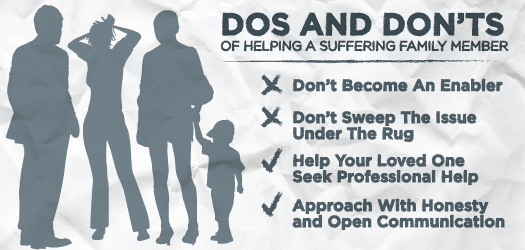Article Provided by: Alan Stevens, MSW, LSW, ACSW ~ CEO of Behavioral Health of the Palm Beaches

Family dynamics can be difficult to manage, even at the best of times. However, when a family member is suffering from addiction or substance abuse, the situation can quickly change from difficult to downright painful.
Families struggling with addiction experience more stress and difficulty communicating than healthy families do, because no matter how the family collectively approaches the issue of addiction, there are always consequences. Even actions taken with the best of intentions, but without well-informed guidance, can result in only exacerbating the severity of the problem.
Enabling Addiction
One of the most common ways families deal with addiction is the unfortunate practice of “enabling.” This is when the behaviors of the rest of the family directly contribute to or even worsen the severity of the addict’s problem, even when the family is trying to simply help.
Consider the example of a family with an adolescent son who is struggling with alcohol abuse. This son – let’s call him Steve – was recently in a car accident as a result of his drinking, and while he somehow managed to avoid being charged with a DUI, his car is a mess. Yet Steve still needs a car so he can continue to go to his high-stress retail job, which is a major contributor to his desire to drink.
If Steve’s family were to pay to fix or replace Steve’s car so that he could continue to go to work – even if they did it with the intention of helping Steve fulfill his responsibilities! – that would only continue to enable Steve’s nascent alcoholism, as he would not be forced to look at the consequences of his actions.
Fighting Against Denial
Another common familial coping mechanism is denial. This is similar to how addicts themselves are frequently in denial about their problem. In this kind of situation, the addict’s family will, for any number of reasons, refuse to acknowledge the metaphorical elephant in the room. As Dr. Tian Dayton says in her paper “The Set Up: Living With Addiction”:
Reality gets rewritten as family members attempt to bend it to make it less threatening; to cover up their ever growing despair. Family members often collude in this denial and anyone who attempts to turn the spotlight onto harsh reality of addiction may be perceived as disloyal. They run in place to keep up appearances (to themselves as well as others) while feeling a sense of despair constantly nipping at their heels.
Families in denial will disregard any evidence of addiction, even when it is staring them in the face. To go with our previous hypothetical family, let’s say that Steve got charged with a DUI as a result of his car accident. A family in denial would loudly object to the charge, claiming anything from:
- The Breathalyzer being incorrectly calibrated
- It being a “misunderstanding”
- Justifying Steve having driven drunk
Denial can even result in making the situation worse, as even if the addict were to make some desperate cry for help, the family would only ignore it or explain it away.
Approaching Addiction the Right Way
Realistically speaking, there is only one way for a family to effectively approach the issue of addiction, and that is through honesty and open communication. It can be painful to realize that someone you are close to is struggling with something so devastating – and it can be even more painful to realize that you may have somehow contributed to that struggle.
However, the solution isn’t to sweep it under the rug or pretend it never happened, nor is it to try and fix it yourself by making things “easier” for your loved one. Overcoming addiction is something that requires a professional.
Whether the family member suffering from addiction is ready to seek help, or even if they are still entrenched in their self-destructive ways, there are options and solutions available. Behavioral Health of the Palm Beaches offers a full suite of medically-supervised recovery programs, as well as professional intervention services.
Article Published December 4, 2013
Last Updated & Reviewed By: Jacquelyn Ekern, MS, LPC on April 10, 2014
Published on AddictionHope.com, Drug & Alcohol Abuse Treatment
